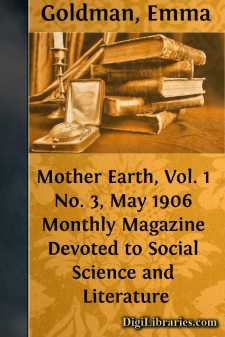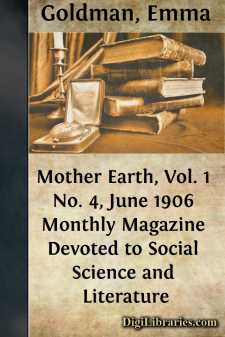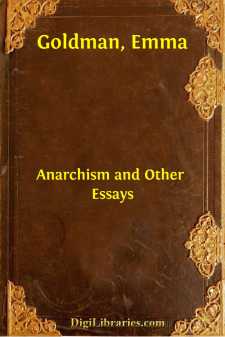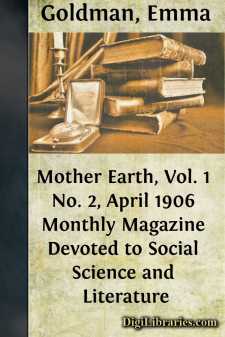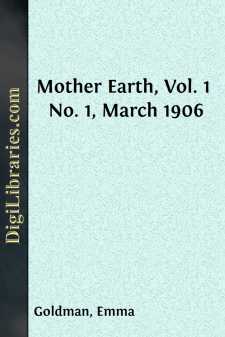Categories
- Antiques & Collectibles 13
- Architecture 36
- Art 48
- Bibles 22
- Biography & Autobiography 813
- Body, Mind & Spirit 141
- Business & Economics 28
- Children's Books 12
- Children's Fiction 9
- Computers 4
- Cooking 94
- Crafts & Hobbies 4
- Drama 346
- Education 46
- Family & Relationships 57
- Fiction 11826
- Games 19
- Gardening 17
- Health & Fitness 34
- History 1377
- House & Home 1
- Humor 147
- Juvenile Fiction 1873
- Juvenile Nonfiction 202
- Language Arts & Disciplines 88
- Law 16
- Literary Collections 686
- Literary Criticism 179
- Mathematics 13
- Medical 41
- Music 40
- Nature 179
- Non-Classifiable 1768
- Performing Arts 7
- Periodicals 1453
- Philosophy 64
- Photography 2
- Poetry 896
- Political Science 203
- Psychology 42
- Reference 154
- Religion 513
- Science 126
- Self-Help 83
- Social Science 81
- Sports & Recreation 34
- Study Aids 3
- Technology & Engineering 59
- Transportation 23
- Travel 463
- True Crime 29
Mother Earth, Vol. 1 No. 3, May 1906 Monthly Magazine Devoted to Social Science and Literature
by: Emma Goldman
Categories:
Description:
Excerpt
TIDINGS OF MAY.
The month of May is a grinning satire on the mode of living of human beings of the present day.
The May sun, with its magic warmth, gives life to so much beauty, so much value.
The dead, grayish brown of the forest and woods is transformed into a rich, intoxicating, delicate, fragrant green.
Golden sun-rays lure flowers and grass from the soil, and kiss branch and tree into blossom and bloom.
Tillers of the soil are beginning their activity with plough, shovel, rake, breaking the firm grip of grim winter upon the Earth, so that the mild spring warmth may penetrate her breast and coax into growth and maturity the seeds lying in her womb.
A great festival seems at hand for which Mother Earth has adorned herself with garments of the richest and most beautiful hues.
What does civilized humanity do with all this splendor? It speculates with it. Usurers, who gamble with the necessities of life, will take possession of Nature's gifts, of wheat and corn, fruit and flowers, and will carry on a shameless trade with them, while millions of toilers, both in country and city, will be permitted to partake of the earth's riches only in medicinal doses and at exorbitant prices.
May's generous promise to mankind, that they were to receive in abundance, is being broken and undone by the existing arrangements of society.
The Spring sends its glad tidings to man through the jubilant songs that stream from the throats of her feathered messengers. "Behold," they sing, "I have such wealth to give away, but you know not how to take. You count and bargain and weigh and measure, rather than feast at my heavily laden tables. You crawl about on the ground, bent by worry and dread, rather than drink in the free balmy air!"
The irony of May is neither cold nor hard. It contains a mild yet convincing appeal to mankind to finally break the power of the Winter not only in Nature, but in our social life,—to free itself from the hard and fixed traditions of a dead past.
By Walt Whitman.
When I peruse the conquered fame of heroes, and the victories of mighty generals, I do not envy the generals,Nor the President in his Presidency, nor the rich in his great house;But when I hear of the brotherhood of lovers, how it was with them,How through life, through dangers, odium, unchanging, long and longThrough youth, and through middle and old age, how unfaltering, how affectionate and faithful they were,Then I am pensive—I hastily walk away, filled with the bitterest envy.
OBSERVATIONS AND COMMENTS.
A young man had an Ideal which he cherished as the most beautiful and greatest treasure he had on earth. He promised himself never to part with it, come what might.
His surroundings, however, repeated from morn till night that one can not feed on Ideals, and that one must become practical if he wishes to get on in life.
When he attempted the practical, he realized that his Ideal could never become reconciled to it. This, at first, caused him deep suffering, but he soon conceived a pleasant thought: "Why should I expose my precious jewel to the vulgarity, coarseness and filth of a practical life?...


